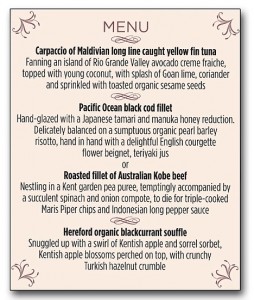TGIF. Grammar and usage in the news this past fortnight include identifying Kathy Bates’s accent on a TV show, a bilingual parrot, a costly misplaced comma, a couple of embarrassing tweets, and a couple of embarrassing typos … Continue reading
Category Archives: In the news …
In the news … (Oct 10)
TGIF. In language usage and abusage news this fortnight: Hugh Grant’s new character offers an English lesson; David Remnick talks about the New Yorker‘s copy-editors; a French MP is fined for using sexist grammar; a new documentary about grammar; and the superiority of paper over digital in book-reading … Continue reading
TGIF: That Gerund Is Funky (Sep 26)
TGIF. In language and usage news this fortnight: a school that teaches in Manx Gaelic; an emergency poet; costly slips of the tongue; zombie nouns; an ominous auto-correct error; punctuation problems in a pre-K campaign; and can Benedict Cumberbatch not say penguin? Continue reading
TGIF: That Gerund Is Funky (Sep 12)
TGIF. In grammar, language and usage news this fortnight: the uber-ubiquity of uber; what little words reveal about us; how economic development is driving the extinction of languages; and who was it that made up the word supercalafragilisticexpialidocious?
* * *
In what some might call an ironic twist of fate, the ride-sharing company Uber faces a ban on one of its services in the country from which the company gets its name: Germany. Linguist Ben Zimmer talks in the Wall Street Journal about the growing ubiquity of uber: it’s uber all of us — and not just in the word’s native land.
* * *
Our use of little words can reveal hidden interests. James Pennebaker, a psychologist interested in the secret life of pronouns, has recorded, transcribed and analyzed conversations that took place between people on speed dates. “We can predict by analyzing their language, who will go on a date — who will match — at rates better than the people themselves,” he says. And he found that “when the language style of two people matched, when they used pronouns, prepositions, articles and so forth in similar ways at similar rates, they were much more likely to end up on a date.” NPR reports how our use of little words can, uh, reveal hidden interests.
* * *
Economic development is driving the extinction of some languages, scientists believe. A study has found that minority languages in the most developed parts of the world, including North America, Europe and Australia, are most at threat. The researchers found that the more successful a country was economically, the more rapidly its languages were being lost. The BBC reports.
* * *
Was the word supercalafragilisticexpialidocious really made up by the Mary Poppins writers? According to mental_floss, there were others who claimed ownership. “Though the Sherman Brothers claimed they made the word up themselves, a 1949 song called “Supercalafajaistickespeealadojus” would seem to say otherwise. The writers of the song, Barney Young and Gloria Parker, sued for $12 million. They lost because lawyers were able to present evidence showing that the nonsense word had been around, in some form or another, for decades. Indeed, the Sherman Brothers later claimed that their made-up word was a variation on a similar word they had heard at summer camp back in the 1930s: ‘super-cadja-flawjalistic-espealedojus.'”
* * *
Another word, knish, was explored on WNYC’s Brian Lehrer Show a few weeks ago.
TGIF : That Gerund Is Funky (Aug 29)
TGIF. In language and usage news this fortnight: grammar rules that can sometimes be broken; a socialite’s guide to elegant expletives; a mispronunciation leads to the renaming of a TV show (if only briefly); the fading art of diagramming sentences; and a childhood spelling error of adult proportions.
* * *
“You shudder at a split infinitive, know when to use ‘that’ or ‘which’ and would never confuse ‘less’ with ‘fewer’ – but are these rules always right, elegant or sensible?” In The Guardian, linguist Steven Pinker identifies 10 ‘grammar rules’ it’s OK to break (sometimes). Continue reading
In the news … (Aug 22)
TGIF. In language, grammar and usage news this week: does how we write tell others how smart we are? Do punctuation and grammar matter when we’re flirting digitally? Does the language of a restaurant’s menu tell us how expensive the restaurant is? Plus some spelling challenges presented to U.S. foreign policy reporters; movie titles that make us cringe; and the Kim Kardashian of punctuation marks …
~~~~
How you write can affect how smart others perceive you to be. According to a piece in the Atlantic, “Typing … in the Comic Sans font … could ruin the whole thing: a Princeton researcher found that a hard-to-read font made an author seem dumber, while a clean, simple typeface (Times New Roman, in the study) made him or her seem more intelligent. The same researcher also looked at how using big words (a classic strategy for impressing others) affects perceived intelligence. Counterintuitively, grandiose vocabulary diminished participants’ impressions of authors’ cerebral capacity. Put another way: simpler writing seems smarter.”
* * *
“The dash is the Kim Kardashian of punctuation marks: misplaced, over-exposed, shamelessly self-promoting, always eager to elbow out her jealous sisters the comma, colon, and semicolon.” So Roy Peter Clark maintains on Poynter.
* * *
The Huffington Post has identified 18 movies whose titles make every grammar geek cringe. It’s mostly a case of missing hyphens (“40 Year-Old Virgin” has a slightly pedophiliac quality to it) and apostrophes (“Two Weeks Notice” cries out for one); but when it comes to Zach Braff’s new movie, he’s
* * *
“Funky or very informal spelling” is the biggest turnoff for both men and women when it comes to digital flirting, according to the results of a digital flirting rules survey done by Omlet, a chat app. …For women, the second biggest turnoff was the lack of punctuation and grammar.” Delaware’s News Journal has the story.
* * *
The Hill has published an article on the spelling challenges of U.S. foreign policy. Is it ISIS or ISIL?
* * *
Does the language of a restaurant’s menu indicate how expensive it is? Dan Jurafsky has found that it does, as reported in the Atlantic. “Fancy restaurants, not surprisingly, use fancier—and longer—words than cheaper restaurants do (think accompaniments and decaffeinated coffee, not sides and decaf)…. Lower-priced restaurants, meanwhile, rely on “linguistic fillers”: subjective words like delicious, flaky, and fluffy. These are the empty calories of menus, less indicative of flavor than of low prices. Cheaper establishments also use terms like ripe and fresh, which Jurafsky calls “status anxiety” words.” Does that mean I get a bargain when “steak frites” is on the menu?
* * *
In the news … (Aug 13)
TGIF. Language and usage in the news this fortnight: this year’s new legit words — both in life and in Scrabble; the controversy over Sanskrit; baby talk — in humans and turtles; John Oliver’s new phrase goes urban; and what’s in a name – your name? It might be more important than you think …
* * *
Oxford Dictionaries have added some new words to the dictionary, including YOLO, amazeballs, and binge-watch. Time has the adorbs story. And while we’re on the subject: Merriam-Webster has released a new version of the Official SCRABBLE Players Dictionary with 5,000 new words, added to reflect new trends, styles and facts of the 21st century. … Words like Continue reading
TGIF: That Gerund Is Funky (Aug 1): the dangerous homophone
from Nyla’s illustrated Word Wall
TGIF: there’s really only one big language-and-usage story in the news this week, and everyone’s talking about it. Yes, it’s about the guy who was fired from his social media strategist job at a Utah school — after talking about homophones (sic) online. Just to be clear: that’s h-phones we’re talking about — not –sapiens, –phobes, –philes, –zygotes, or –sexuals.
According to a report in The Independent, “Tim Torkildson, the former employee at the Nomen Global Language Center, said he was removed from his Continue reading
TGIF: That Gerund Is Funky (July 25)
An appropriate name for this type of doctor ... (seen on Manhattan’s Upper West Side)
TGIF. Language and usage in the news this week: a missing comma in a tweet; how to pronounce a footballer’s name; Zach Braff’s bad grammar; and a different typ(o) of freedom …
* * *
AP sent the Twittersphere into a frenzy when it left an important comma out of one its tweets:
Yes, we do need commas. Even when we’re tweeting …
* * *
Zach Braff used bad grammar on purpose in the title of his new movie, Wish I Was Here. Continue reading
TGIF: That Gerund Is Funky (July 18)
TGIF: That Gerund Is Funky …
In language and grammar news this past fortnight: a fight over the name Duke (which doesn’t include Bo, Luke or Daisy); the grammar of police shootings; a possible typo in the Declaration of Independence; the effect of bad spelling on sales – but how it can also save you a fortune; and a treasure-trove of lists from mental_floss — which include ancient slang for sex and origins of nursery rhymes and state names.
~~~
John Wayne’s heirs are duking it out in court with Duke University (in North Carolina) to use his longstanding nickname — “Duke” — to market a line of bourbon. The BBC has the report.










